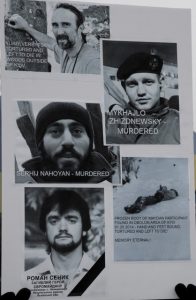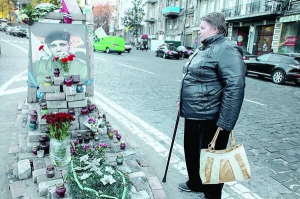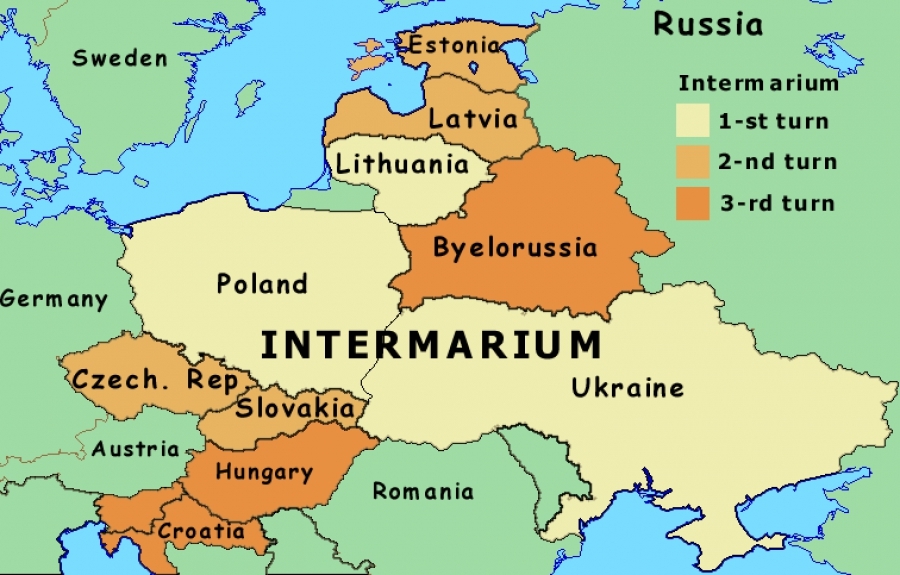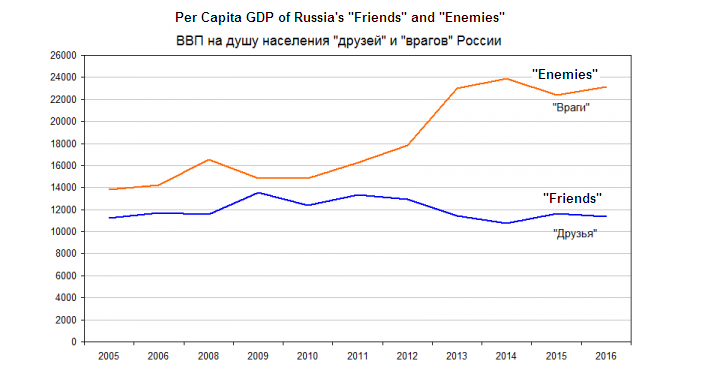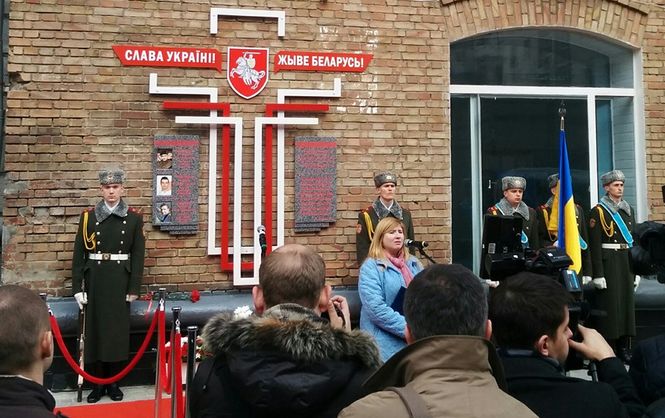“When Misha’s father saw the desecrated grave of our son, Misha, he fell ill and almost died of a heart attack. He wept for a long time. Then he said that he’d go to the Maidan, pour gasoline over himself and set himself on fire. Maybe then someone would take notice….” cries 59-year-old Nina Zhyzneuska, the mother of a hero of the Heavenly Hundred, Mikhail Zhyzneuski.
Nina travelled from Belarus to take part in the “March of the Heroes” in Kyiv on October 14. She wanted to meet Petro Poroshenko. Last year in February, the President promised to award the Order of Hero of Ukraine posthumously to her son. This still has not been done….
We meet Nina on October 15 in front of the Dynamo Stadium in Kyiv. She stands in the middle of the road, at the spot where her son, Mikhail was shot and killed on January 22, 2014. A pedestal has been built with pavement blocks. A photograph of Mikhail Zhyzneuski stands on top of the improvised memorial. Blue and yellow ribbons are tied around it. A wreath and a 5-liter plastic bottle with red chrysanthemums have been placed before the memorial. Nina leans on her cane. She has difficulty walking after a heart attack she suffered last spring..
“A monument to Misha was erected on his grave in the village of Stiah Pratsi near Gomel this summer.” says Nina. We cross the street and sit in the car of her friends who drove her to Kyiv. “They made a big and beautiful monument. Volunteers gave us some money. We borrowed the rest and we’re still paying off those debts. We insured the monument immediately because we expected acts of provocation.”
“On October 1 I got a call from a Gomel journalist: “Nina, we’ve sent a report to the police because someone has scratched the word “Traitor!” all across your son’s monument.” My husband and I went to the grave immediately. We burst into tears when we saw the desecrated stone… We called the police and filed a complaint. The police said that the cemetery is quiet and calm, and that they wouldn’t know where to look for these persons. They won’t investigate our case. They know who did it. I think I know, too, but I can’t give a name because I have no proof.”
Tears flow down Nina’s cheeks…
“The Hero of Ukraine award would really help change our people’s attitude towards Misha. Poroshenko promised to do this. Last winter, on the day commemorating the heroes of the Heavenly Hundred, I managed to get through security and approach the president. He took my phone number and promised to settle the matter. But nothing’s happened. Now I’d like to meet and talk to him again.”

Nina wipes her tears and puts her handkerchief in a bright tattered handbag.
“We became outcasts in Belarus after our son’s death. We couldn’t walk through the streets of Gomel. Last year, our daughter Natasha was expelled from Francisk Skorina Gomel State University. Her professor, a former Komsomol member, told Natasha that her brother was a bandit and a Nazi thug, and accused him of fighting on the Maidan for money. She refused to accept Natasha’s graduate thesis because she didn’t like the subject of her work. Several journalists reported Natasha’s story and she was readmitted to the university. The professor has retired.”
Nina is silent. She places her hands on her heart and massages it gently.
“40 days after Misha’s death, I began having pains in my chest. I was diagnosed with a massive heart attack. I had bypass surgery. I have stents in each vessel. Only 25 percent of my heart functions normally. Doctors say: “We don’t know how much time you have left. You’re alive now because you’re such an optimist!” I want Misha to get the Hero of Ukraine award before I die. Then I’ll know that his grave will be protected by Ukraine. I’m so afraid that I’ll die and won’t have time to do this.”
Mikhail Zhyzneuski was born in Gomel, Belarus. He moved to Ukraine when he was 17, and settled in Bila Tserkva near Kyiv.
“He fell in love with a girl from Donetsk.” says Nina “She moved closer to the capital, and he followed her. They lived together for some time. About five years later I asked him about his girl. He told me she had died. I didn’t ask him about the details. I thought that he’d tell me himself when he was ready. But he didn’t have the time….”
“Misha looked like a little girl when he was a child. He played with dolls and loved to cook jam. Every summer, he helped me make preserves with vegetables and mushrooms. He just asked me to watch and let him know if he was doing everything correctly. He loved fried potatoes with milk. He often asked me to get some potatoes ready while he ran out to get the milk.”
“I often dream about Misha. The last time he spoke to me in my dream: “Tell Alyosha – that’s his good friend who was also on the Maidan – that he must fight for Ukraine till the very end. Misha loved Ukraine. It was his homeland.”
